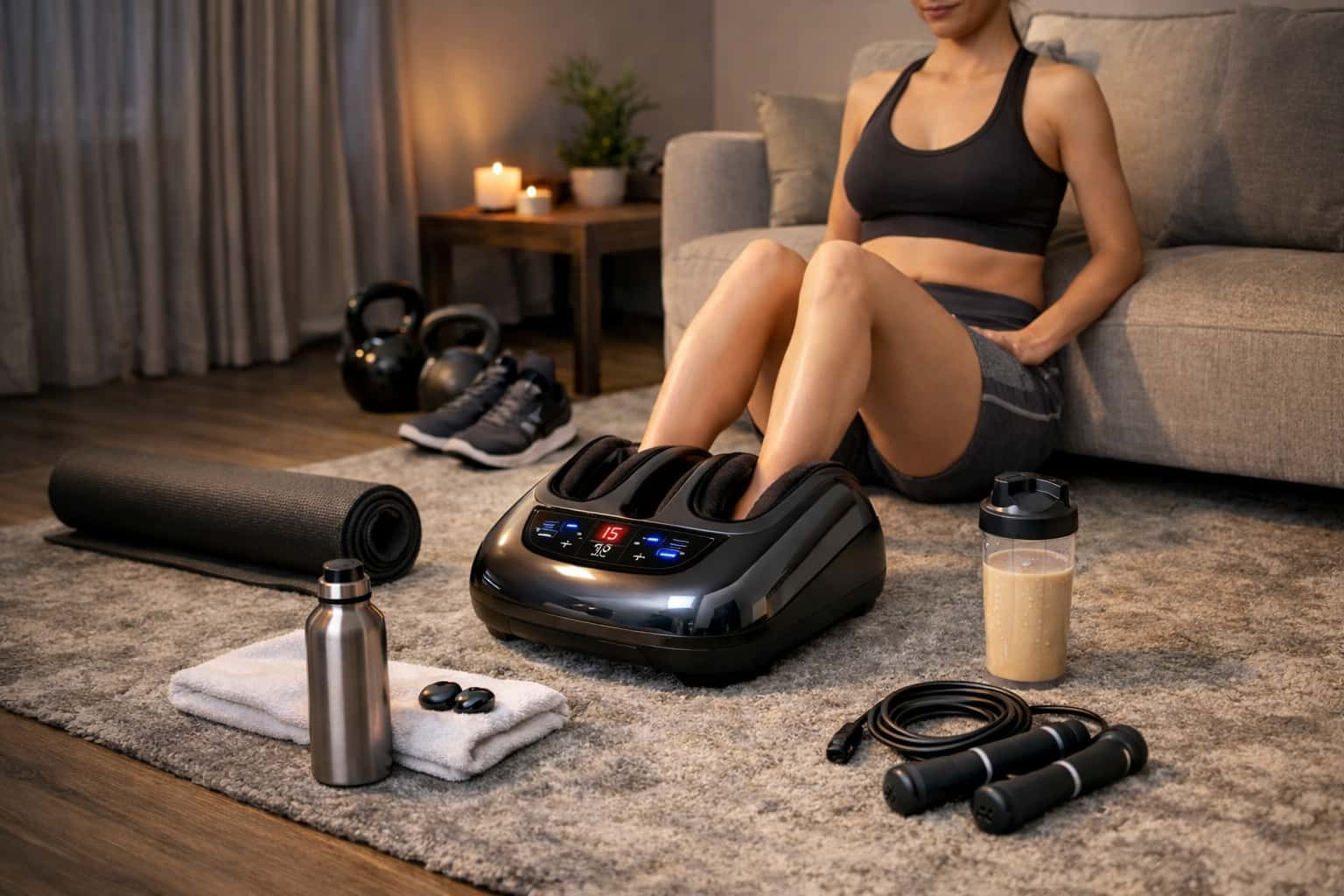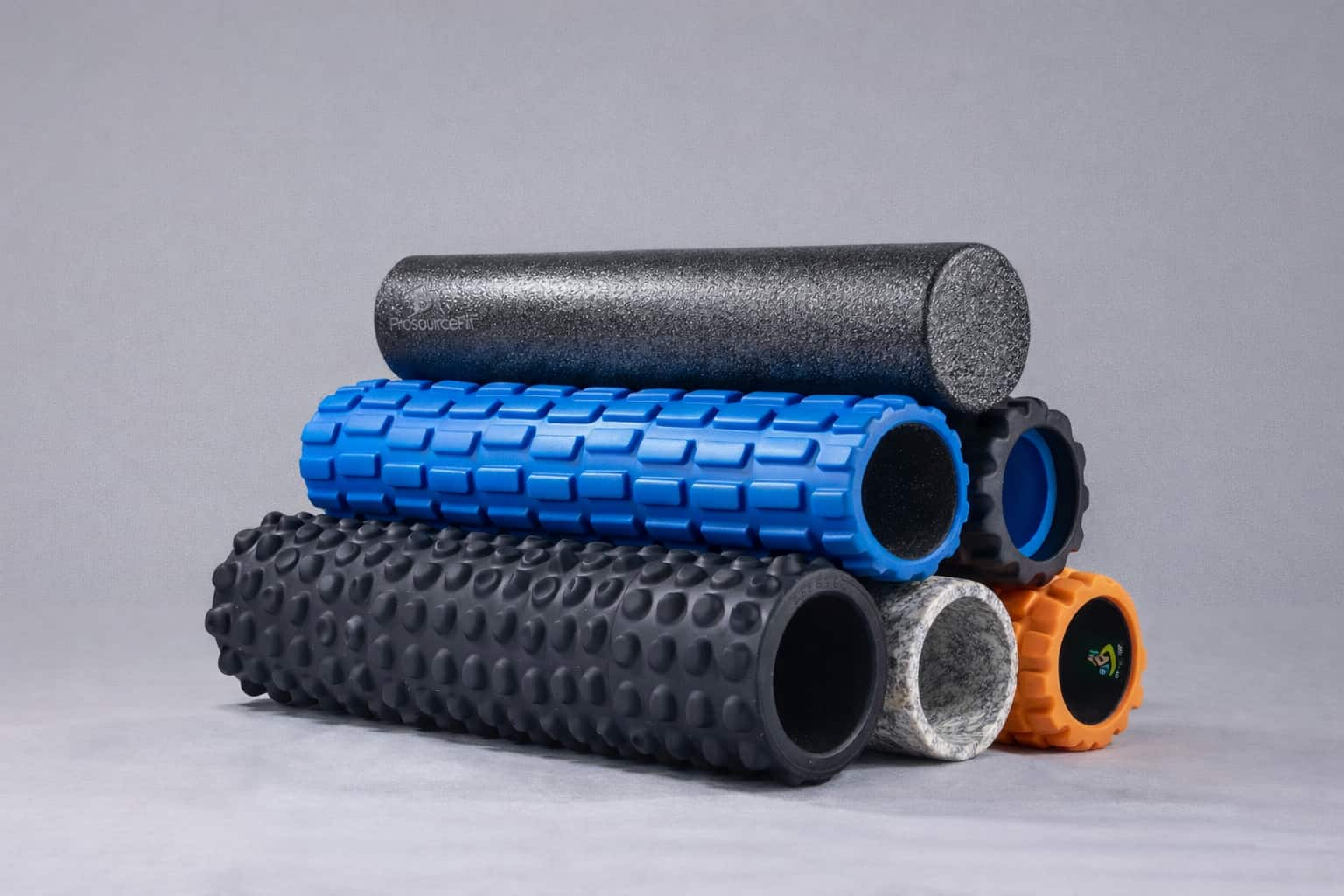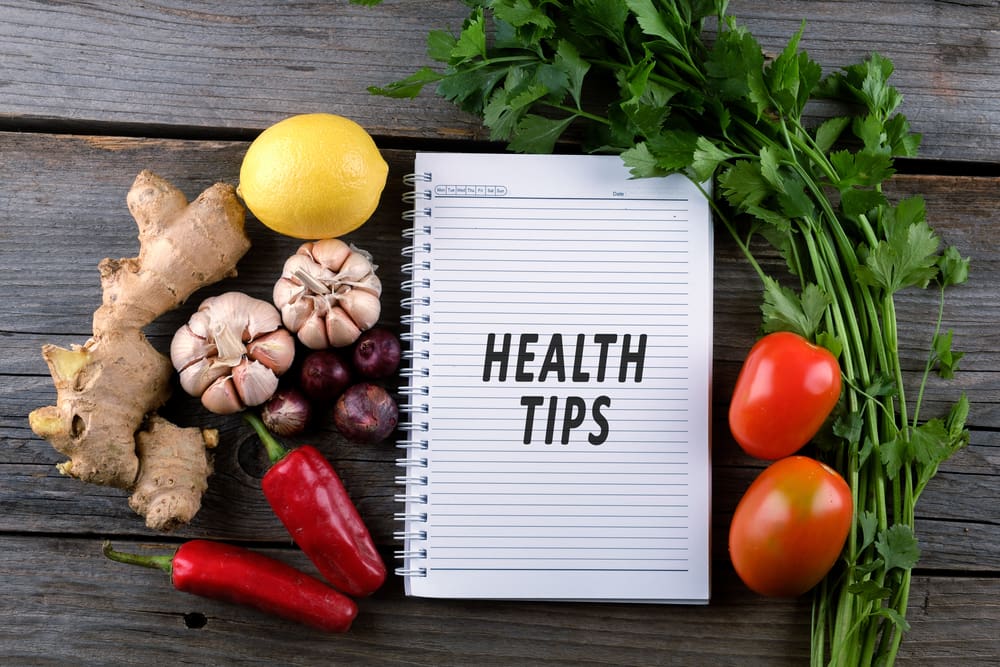Complete Women’s Health Tips for Every Age
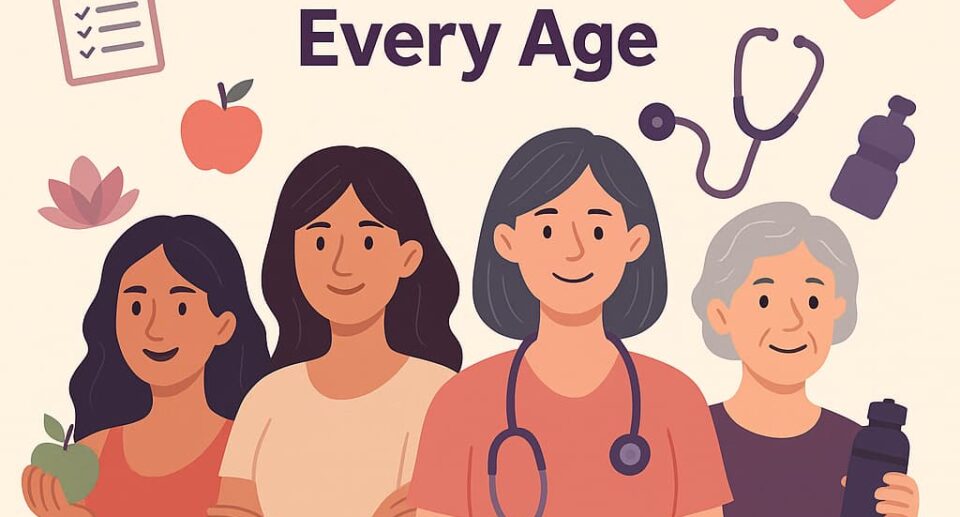

Why Women’s Health Needs a Lifelong Focus
From the teenage rush of hormones to the graceful wisdom of the 40s and beyond, a woman’s body is nothing short of extraordinary constantly evolving, adapting, and balancing countless changes. Yet, when it comes to health advice, we often hear the same generic line: “Eat well and exercise regularly.” Sure, that’s great advice but let’s be honest, it’s far from enough!
Every stage of a woman’s life brings its own rhythm the vibrant energy of the 20s, the multitasking chaos of the 30s, and the graceful resilience of the 40s. What your body needs in each of these decades isn’t the same. That’s why a “one-size-fits-all” approach simply doesn’t work.
True wellness isn’t just about avoiding sickness; it’s about achieving harmony balancing your physical strength, emotional wellbeing, and social confidence. Whether it’s managing hormones, nurturing mental health, or finding that elusive “me-time” amid life’s whirlwind, every woman deserves a plan that evolves with her.
So, take a deep breath, grab your favorite tea, and let’s explore how you can nurture your health not just to survive, but to truly thrive at every stage of life.
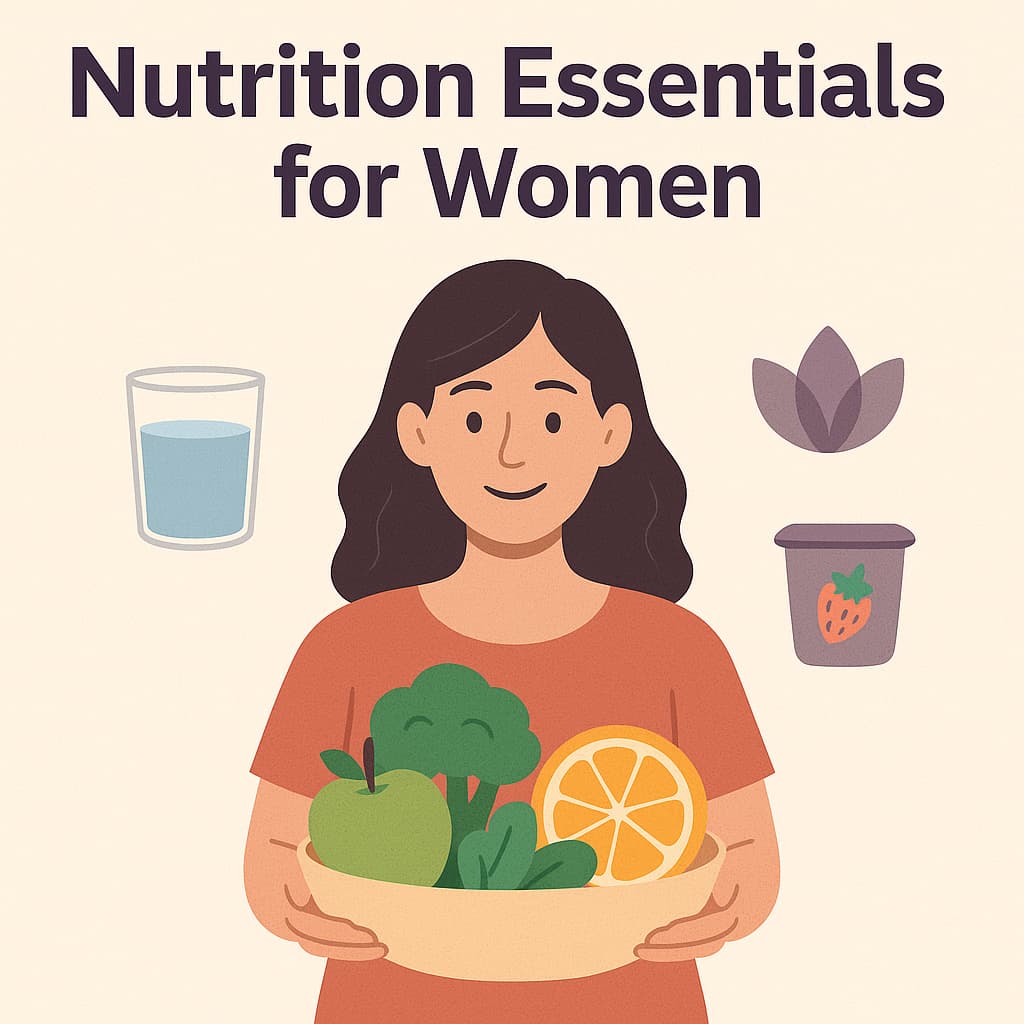

Nutrition Essentials for Women
They say, “You are what you eat” and when it comes to women’s health, this couldn’t be truer. From energy levels to glowing skin, from mood stability to hormone balance, nutrition shapes every aspect of a woman’s wellbeing. But let’s face it with so many “diet trends” shouting for attention, figuring out what actually works can feel overwhelming.
The golden rule? Balanced nutrition over fad diets. Your plate should be a colorful mix of lean proteins, complex carbs, healthy fats, and a rainbow of fruits and vegetables. Each color brings its own health magic reds rich in antioxidants, greens loaded with iron, and yellows bursting with vitamins.
For a science-backed perspective, check out this excellent resource from Harvard’s School of Public Health on The Healthy Eating Plate. It’s a clear visual guide that simplifies what balanced eating really looks like.
Women also have unique nutritional needs particularly when it comes to iron, calcium, vitamin D, folate, and B12. Iron keeps fatigue at bay, calcium builds bone strength, and vitamin D helps your body absorb that calcium efficiently. Folate (especially for women of reproductive age) supports cellular health and pregnancy readiness, while B12 keeps your brain sharp and your nerves strong.
If you’re a busy woman juggling work, family, and fitness goals, here’s a practical tip:
Plan your meals weekly and prep healthy snacks ahead of time almonds, fruit slices, yogurt, or boiled eggs. Small habits like these prevent energy crashes and late-night junk food binges.
Want to explore women-focused dietary recommendations further? The Office on Women’s Health (OWH) by the U.S. Department of Health and Human Services offers excellent guidance tailored to each life stage.
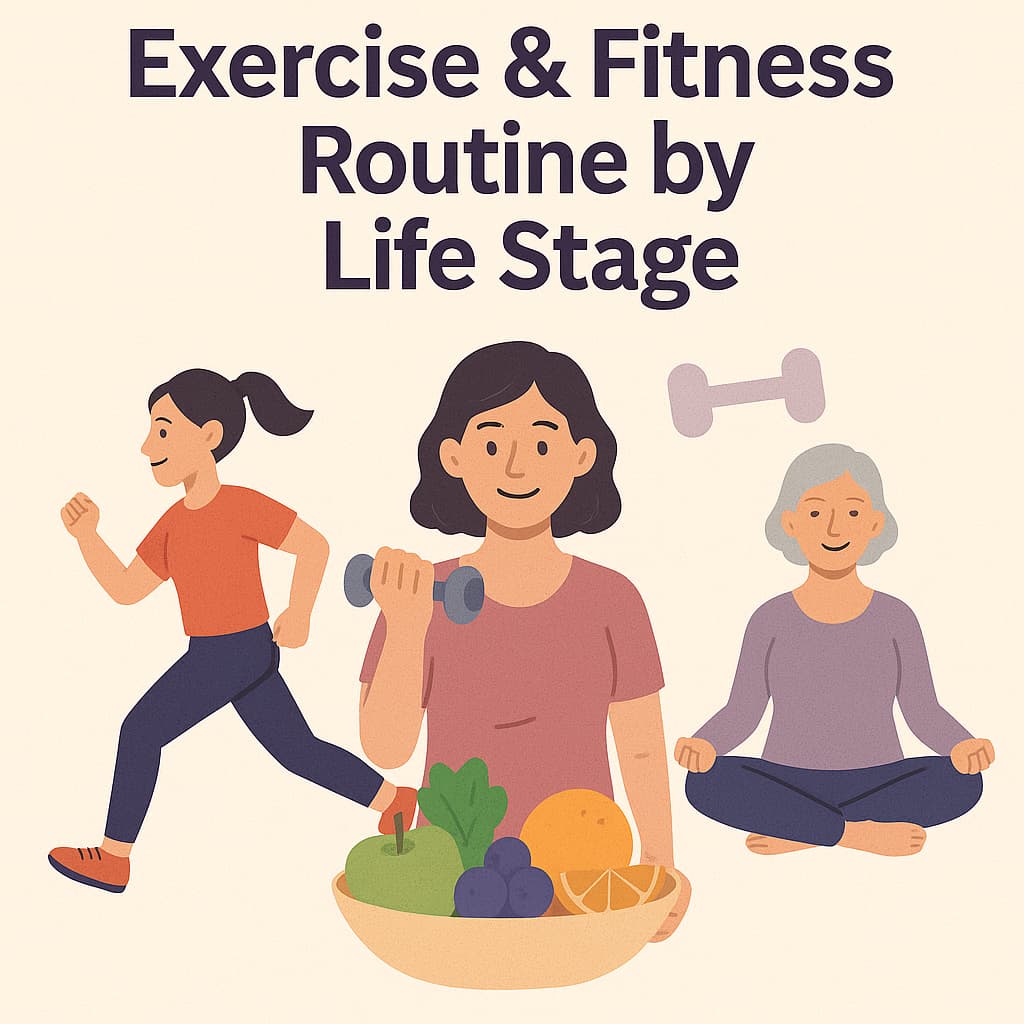

Exercise & Fitness Routine by Life Stage
Exercise isn’t just about burning calories it’s about building strength, balance, and resilience that last a lifetime. For women, fitness plays a crucial role in regulating hormones, supporting bone health, boosting mood, and keeping the heart young. But here’s the secret most people overlook: your fitness needs evolve with your age and lifestyle. What works for you at 22 may not serve you well at 42 and that’s perfectly okay.
Let’s break down how you can stay active, strong, and confident at every stage of life.
In Your 20s: Build the Foundation
Your 20s are all about energy, flexibility, and developing lifelong habits. It’s the best time to build bone density and cardiovascular endurance.
Focus on strength training lifting weights or using resistance bands helps boost metabolism and shape lean muscle.
Include flexibility workouts like yoga or Pilates to improve posture and prevent injury.
Don’t skip cardio! Jogging, cycling, or dancing for 30 minutes a day strengthens your heart and lungs.
Combine your workout with protein-rich meals to enhance recovery and muscle tone.
Learn more from Mayo Clinic’s beginner exercise guide, which shows how to safely start and maintain a workout routine.
In Your 30s: Balance Strength and Stress
Life in your 30s can be hectic juggling career, home, and sometimes motherhood. The metabolism starts to slow down, and stress hormones (like cortisol) can easily spike.
Circuit training or HIIT (High-Intensity Interval Training) helps burn fat efficiently within a short time.
Add mindful workouts like yoga or tai chi to reduce stress and support hormonal balance.
Strength exercises for core and pelvic muscles are essential, especially after childbirth.
Try to stay active throughout the day take stairs, walk during calls, or stretch every hour.
The American Heart Association’s fitness recommendations outline how much activity you really need each week for optimal heart health.
In Your 40s and Beyond: Protect and Rejuvenate
By the time you reach your 40s, maintaining muscle mass and bone strength becomes the top priority. Hormonal changes during perimenopause and menopause can affect energy and weight distribution.
Resistance training (bodyweight, dumbbells, or resistance bands) is vital to prevent osteoporosis.
Low-impact cardio like brisk walking, swimming, or cycling supports joint health while keeping the heart strong.
Practice balance and stretching exercises to reduce stiffness and improve mobility.
Combine physical activity with good sleep and nutrition the trio that keeps your metabolism and mood steady.
For menopause-friendly workouts, see Cleveland Clinic’s fitness guide for women over 40.
Across All Ages: Make Movement a Lifestyle
Set realistic goals consistency beats intensity.
Find what you love dance, hiking, yoga, or simple home workouts.
Listen to your body; rest days are part of recovery.
Stay hydrated, and track your progress for motivation.
Even light activity such as walking 30 minutes daily can reduce your risk of chronic disease, improve mood, and increase longevity. The key is to move often and move with joy.
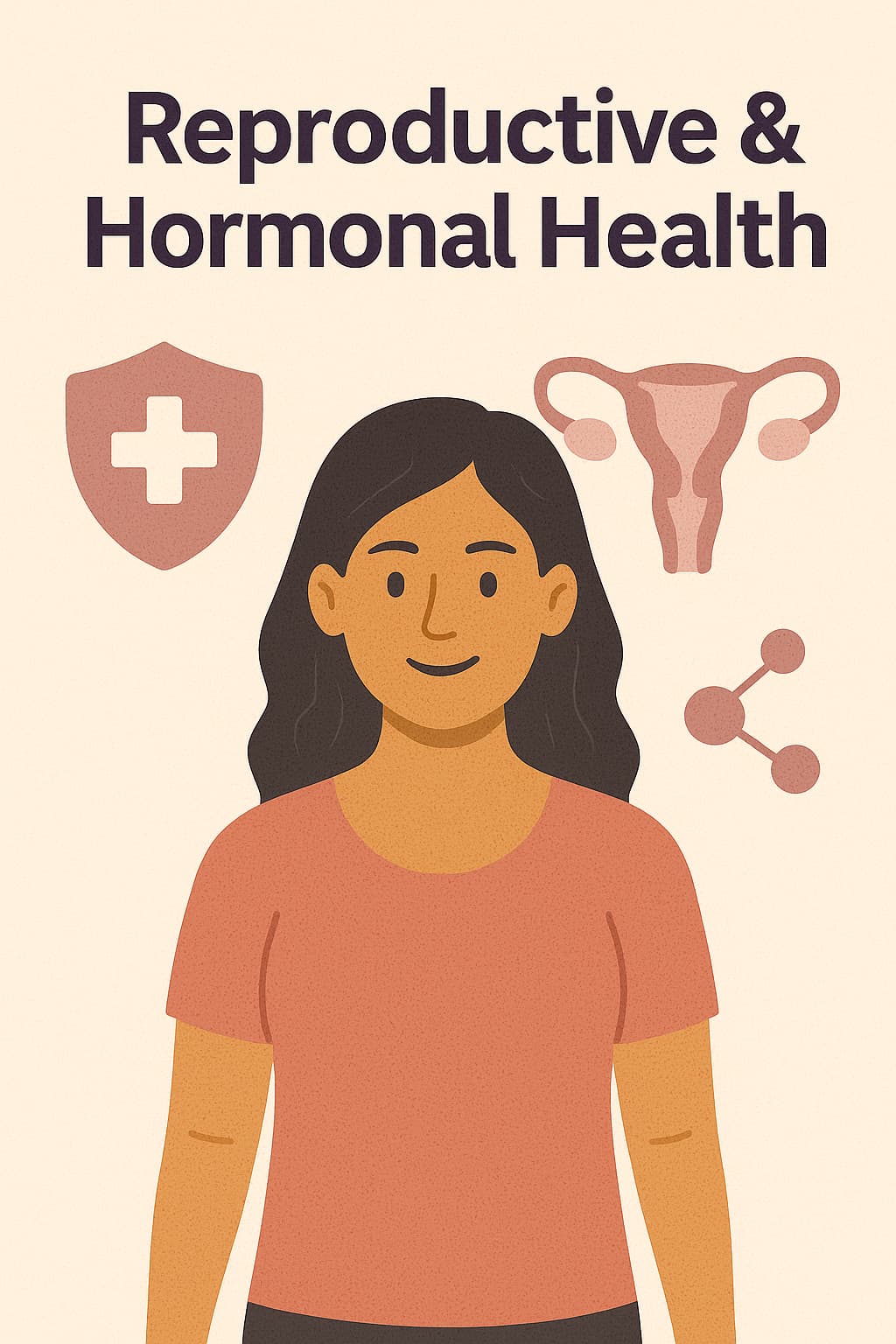

Reproductive & Hormonal Health
A woman’s body is a masterpiece of hormonal rhythm constantly shifting to maintain balance through menstruation, pregnancy, and menopause. Understanding this rhythm is key to feeling in control, rather than confused by it. Reproductive and hormonal health aren’t topics to whisper about; they are central to a woman’s strength, mood, and overall wellness.
Menstrual Health: Listening to Your Monthly Signals
Your menstrual cycle is more than just a calendar date it’s a window into your body’s inner health. Regular cycles (typically 21–35 days) indicate hormonal stability, while irregular, painful, or heavy periods can be signs of conditions like PCOS (Polycystic Ovary Syndrome), thyroid imbalance, or nutritional deficiencies.
To support menstrual health:
Maintain a balanced diet rich in iron, magnesium, and omega-3 fats.
Track your cycle using apps or journals awareness is empowerment.
Get adequate sleep and hydration, both essential for hormonal balance.
Avoid excessive caffeine or processed sugar, which can trigger cramps and irritability.
Remember, your period should not be a monthly struggle. If pain or irregularity disrupts your life, consulting a gynecologist can help identify and manage the root cause.
PCOS and Hormonal Imbalance: Regaining Control
Many women in their 20s and 30s experience PCOS — a condition where hormonal imbalance leads to irregular periods, acne, weight gain, or difficulty conceiving. But the good news is that lifestyle plays a huge role in management.
Focus on regular exercise and weight management to stabilize insulin and hormone levels.
Choose low-glycemic foods like whole grains, vegetables, and lean proteins.
Manage stress through yoga, breathing, or journaling cortisol spikes can worsen hormonal imbalance.
Small daily habits, done consistently, can restore hormonal harmony and improve overall wellbeing.
Pregnancy and Postpartum Wellbeing
Pregnancy is one of the most transformative experiences for a woman’s body physically, hormonally, and emotionally. Nutrition, sleep, and gentle activity become essential pillars of care.
Prioritize prenatal vitamins and iron-rich foods to support baby and mother.
Gentle walks or pregnancy-safe yoga improve circulation and reduce fatigue.
During postpartum recovery, don’t rush your body is healing and adjusting hormonally.
Seek emotional support if you feel anxious or sad; postpartum mood changes are normal but deserve attention.
Every mother’s journey is unique there’s no universal timeline for recovery. Listening to your body and being kind to yourself is the true path to healing.
Perimenopause and Menopause: A New Chapter, Not an Ending
As women approach their 40s and 50s, estrogen levels begin to fluctuate, leading to changes such as hot flashes, mood swings, and irregular periods. This transition, though challenging, is a natural stage of life not a sign of decline.
Maintain a balanced diet rich in calcium and vitamin D for bone health.
Keep moving strength and flexibility exercises help manage weight and joint pain.
Stay hydrated to reduce hot flashes and dry skin.
Focus on emotional wellness; mindfulness and open communication can ease anxiety and mood changes.
Menopause marks freedom from monthly cycles a phase to celebrate experience, wisdom, and self-prioritization.
Reproductive Health Beyond Hormones
Your reproductive system also deserves routine care annual checkups, cervical screening, and breast self-exams are vital. Hygiene, safe intimacy, and open communication with healthcare professionals are all parts of proactive health management.
A woman’s reproductive and hormonal health is not just about fertility; it’s about balance, vitality, and the confidence that comes from understanding one’s body. When you work with your body not against it you unlock the strength and grace that define womanhood itself.
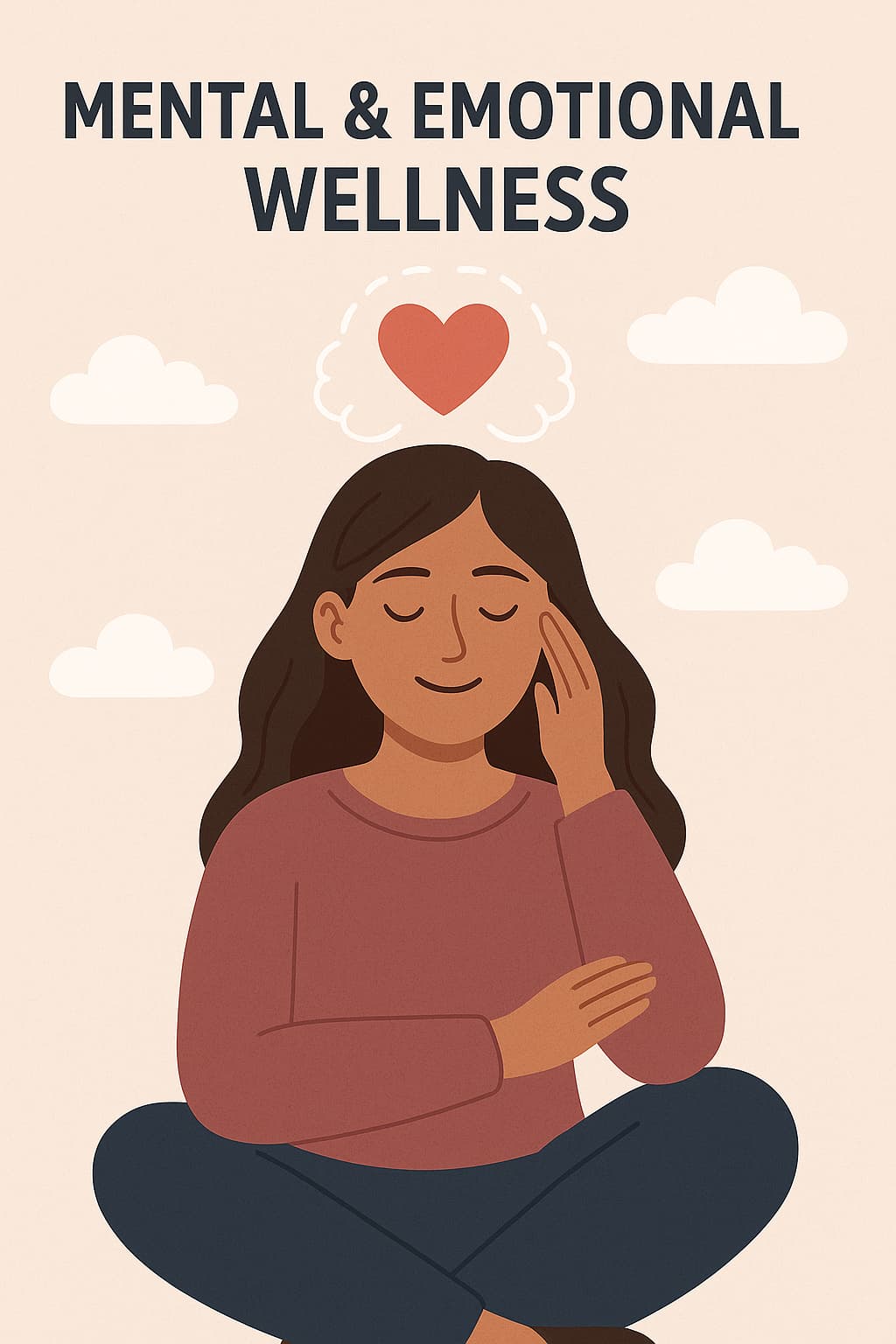

Mental & Emotional Wellness
Your mind is the control center of your entire wellbeing when it thrives, everything else falls beautifully into place. Yet, many women spend their days caring for everyone else while forgetting to recharge their own emotional batteries. Mental and emotional wellness isn’t a luxury; it’s the foundation of sustainable health.
Understanding the Mind–Body Connection
Stress, anxiety, and emotional exhaustion often show up not just in your thoughts, but in your body — fatigue, muscle tension, headaches, or even hormonal fluctuations. When your mind feels cluttered, your body responds. Taking care of mental health is, therefore, just as vital as your diet or fitness routine.
At CoreWellFit, we believe in a whole-person approach to wellness nourishing the body and mind together. Emotional balance, after all, isn’t something you find; it’s something you build through daily habits that strengthen your mental resilience.
Stress Management: Reclaiming Inner Calm
Women often juggle multiple roles professional, caregiver, partner, friend — and that constant balancing act can raise cortisol levels (the stress hormone), leaving you drained.
Try these small, effective stress management habits:
Practice mindful breathing for 5–10 minutes daily. It lowers heart rate and relaxes the nervous system.
Keep a gratitude or reflection journal it helps declutter thoughts and foster positivity.
Spend time outdoors sunlight and nature instantly improve mood and energy.
Take regular digital detox breaks put your phone away and be fully present in the moment.
You can explore simple mindfulness and stress-relief practices on CoreWellFit’s Mind-Body section, designed especially for busy women who need short, effective mental resets during their day.
Self-Care: The Art of Saying “Yes” to Yourself
Self-care isn’t selfish it’s self-respect. Setting boundaries, taking rest days, and doing things that genuinely make you happy are all acts of mental nourishment.
Schedule weekly “me-time,” whether it’s a long bath, your favorite book, or an evening walk.
Learn to say no when your plate is full. Boundaries protect energy.
Replace guilt with grace you don’t need to earn rest; you deserve it.
When you honor your emotions and prioritize recovery, your productivity, relationships, and confidence naturally bloom.
Sleep Hygiene: The Forgotten Pillar of Mental Health
Poor sleep affects memory, focus, mood, and even metabolism. Most women need 7–9 hours of restful sleep, but stress and late-night scrolling often get in the way.
Here’s how to reclaim quality sleep:
Maintain a consistent bedtime and wake-up time even on weekends.
Keep your bedroom dark, cool, and screen-free.
Avoid caffeine or heavy meals within 3 hours of bedtime.
Practice relaxing rituals soft music, breathing, or light reading.
Think of sleep as your mind’s nightly detox it’s how your brain resets, repairs, and restores balance.
Emotional Support & Connection
No woman should feel alone in her struggles. Talk to someone a trusted friend, counselor, or therapist. Emotional conversations are not signs of weakness but of courage and growth.
When you express your emotions instead of suppressing them, you make room for healing and clarity.
If you ever need inspiration or practical tips to build emotional strength, the CoreWellFit Wellness Blog shares evidence-based strategies and stories to keep your mental health journey motivated and grounded.
A healthy mind is the strongest ally a woman can have. When you nurture your emotional wellbeing, everything from your relationships to your physical health begins to shine brighter. So take that deep breath, release the guilt, and remember: you deserve peace just as much as progress.
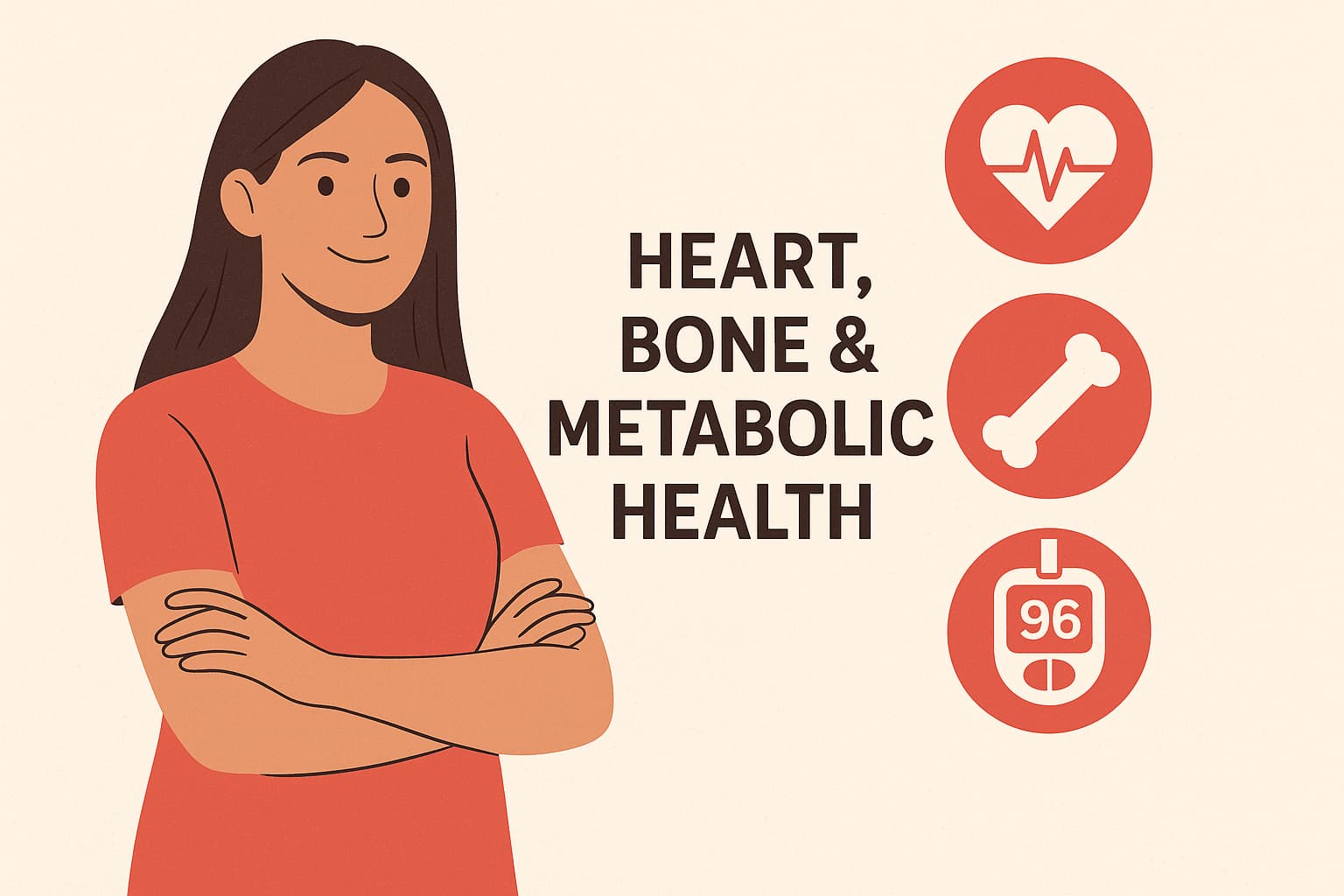

Heart, Bone & Metabolic Health
When we talk about women’s health, we often focus on nutrition, hormones, or fitness yet the silent guardians of vitality are the heart, bones, and metabolism. These three systems work in harmony to keep your body strong, balanced, and full of life. Ignoring them can lead to fatigue, fragility, and chronic illness over time. The good news? With small, consistent habits, you can protect all three and feel energized at every age.
Heart Health: Your Body’s Lifelong Engine
The heart beats about 100,000 times a day yet most women only pay attention when something goes wrong. Heart disease is one of the leading causes of death among women, and its symptoms often appear differently than in men. Instead of sharp chest pain, women may feel fatigue, shortness of breath, or pressure in the chest, neck, or jaw.
To keep your heart strong:
Eat for your heart. Choose fresh vegetables, whole grains, lean proteins, and healthy fats like olive oil, nuts, and fish. Limit added sugars and sodium.
Move daily. Even 30 minutes of brisk walking can improve circulation and lower blood pressure.
Manage stress. Chronic stress triggers hormonal changes that strain your cardiovascular system.
Avoid smoking and limit alcohol, both of which increase the risk of heart and vascular damage.
Know your numbers. Keep track of blood pressure, cholesterol, and glucose levels, especially after your 30s.
Your heart doesn’t just keep you alive it keeps you vibrant. Treat it with the same care you give to your loved ones.
Bone Health: The Invisible Strength Within
Bones are living tissue they rebuild and repair themselves constantly. But after age 30, bone density naturally starts to decline, making women more prone to osteoporosis, especially after menopause when estrogen levels drop.
To support lifelong bone strength:
Boost calcium and vitamin D. Dairy, leafy greens, tofu, almonds, and fortified cereals are excellent sources.
Do weight-bearing exercises such as squats, lunges, or stair climbing. Resistance workouts stimulate bone growth.
Get sunlight exposure for natural vitamin D synthesis.
Avoid excessive caffeine or soft drinks, which can interfere with calcium absorption.
Schedule bone density tests after 40 to monitor early signs of loss.
Think of your bones as your body’s scaffolding invisible but vital. The stronger they are, the more confidently you can move, lift, and live.
Metabolic Health: The Silent Regulator
Metabolism is your body’s internal engine converting food into energy, maintaining weight, and balancing hormones. As women age, metabolism slows down naturally, making it easier to gain weight and harder to lose it. But the key isn’t starvation diets it’s metabolic support through smart habits.
Eat balanced meals regularly. Skipping breakfast or long fasting can confuse your metabolism.
Build muscle. More muscle mass equals higher resting metabolism. Strength training twice a week can make a real difference.
Stay hydrated. Water helps in digestion, detoxification, and nutrient absorption.
Prioritize quality sleep. Poor sleep disrupts hunger-regulating hormones like leptin and ghrelin.
Manage stress. High cortisol leads to fat accumulation, especially around the abdomen.
Healthy metabolism isn’t about burning calories fast it’s about balance, consistency, and energy stability throughout the day.
The Trio Connection: How They Work Together
Your heart pumps nutrients to your bones and muscles. Your bones support movement that keeps your heart strong. And your metabolism fuels the entire process. Together, they form the foundation of women’s vitality protecting you from chronic fatigue, weight imbalance, and age-related decline.
Whether you’re 25 or 55, nurturing these three systems means investing in your future one heartbeat, one movement, and one mindful meal at a time.
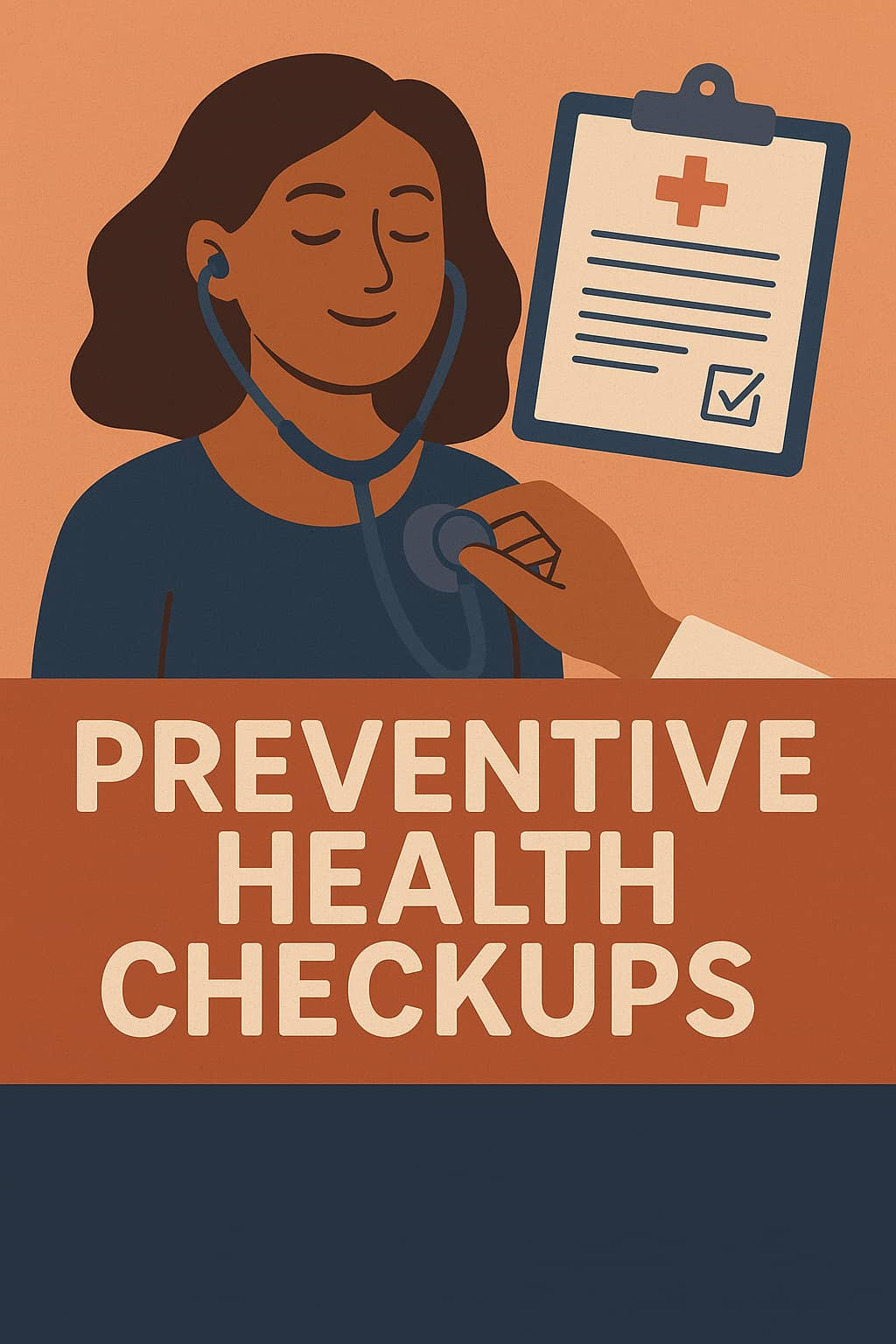

Preventive Health Checkups
Prevention has always been smarter and far easier than cure. Regular health checkups aren’t about finding illness; they’re about staying one step ahead of it. For women, preventive care means catching small issues before they grow into bigger challenges. Whether it’s a blood test, screening, or routine physical, each appointment is an investment in your future wellbeing.
Renowned health organizations such as the World Health Organization (WHO), the American College of Obstetricians and Gynecologists (ACOG), and the Centers for Disease Control and Prevention (CDC) all emphasize that women should follow an age-appropriate screening schedule to protect their heart, reproductive system, and metabolic health.
Routine Health Screenings by Age Group
| Age Group | Recommended Screenings & Tests | Purpose & Notes |
|---|---|---|
| Teens (13–19) | – Physical examination – HPV vaccination – Menstrual cycle tracking | Establish a health baseline and monitor reproductive development. Early vaccination prevents cervical cancer. |
| 20s | – Annual physical checkup – Pap smear every 3 years – Blood pressure & BMI – Dental & eye exam | Detect early cervical cell changes, monitor heart health, and maintain general wellness. |
| 30s | – Pap smear + HPV test every 5 years – Blood glucose & lipid profile – Thyroid function test – Skin and breast self-exam | Identify risks of diabetes, cholesterol issues, thyroid imbalance, and breast abnormalities. |
| 40s | – Mammogram every 1–2 years – Blood sugar & cholesterol – Bone density baseline – Eye & dental checkup | Early detection of breast cancer, osteoporosis, and cardiovascular diseases. |
| 50s and Beyond | – Colonoscopy every 10 years – Bone density every 2 years – Mammogram annually – Blood pressure & glucose monitoring – Thyroid, kidney, and liver function tests | Prevent colon, breast, and bone-related diseases; monitor organ function and hormone changes during menopause. |
Additional Annual or Lifestyle-Based Screenings
Reproductive health: Pelvic exam and gynecological assessment every year.
Heart health: Blood pressure, ECG, and lipid profile if you have a family history of heart disease.
Bone health: Especially crucial for postmenopausal women or those with low calcium intake.
Mental wellness: Discuss mood, stress, and sleep with your healthcare provider — emotional wellbeing is part of preventive care too.
Vaccinations: Maintain updated immunizations for influenza, tetanus, and hepatitis as advised by your physician.
Why Preventive Checkups Matter
Early detection saves lives. Diseases like breast cancer, diabetes, and hypertension often develop silently before symptoms appear.
Better quality of life. Regular monitoring keeps you active, alert, and confident about your health.
Reduced medical costs. Catching problems early prevents expensive long-term treatments.
Empowerment through knowledge. Knowing your numbers BP, glucose, cholesterol, BMI gives you control over your health decisions.
Creating a Personal Health Record
Keep a small notebook or digital record with your latest test results, vaccination dates, and doctor’s advice. This simple step ensures you and your healthcare providers have a clear view of your medical history at every stage of life.
Preventive care isn’t about fear it’s about freedom. The freedom to live fully, confidently, and with peace of mind. Every test, every checkup, every health-conscious choice adds another strong year to your life’s journey.
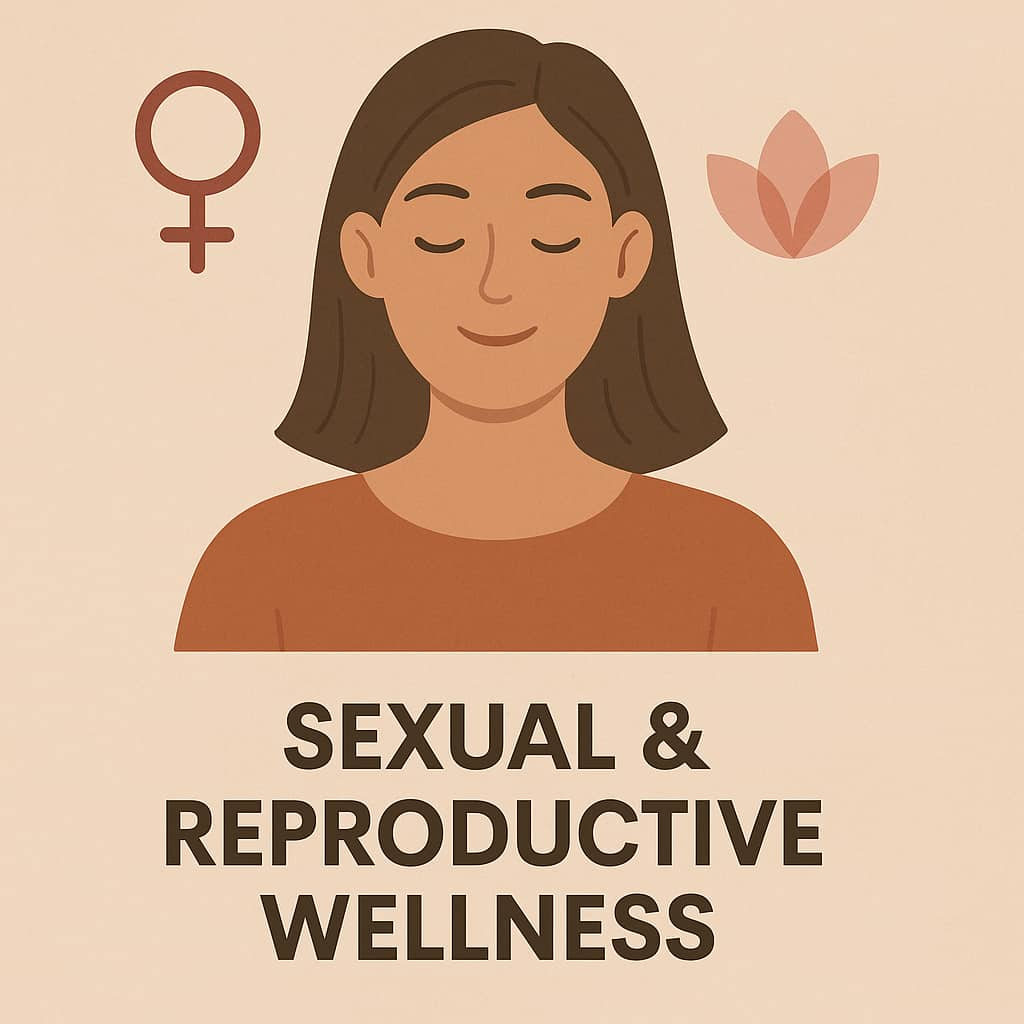

Sexual & Reproductive Wellness
Sexual and reproductive wellness is an essential yet often overlooked part of women’s overall health. It’s not about intimacy alone; it’s about understanding your body, feeling confident in your own skin, and maintaining hygiene and awareness that protect long-term wellbeing. A woman who knows her body well can make informed choices that bring balance, comfort, and self-assurance at every stage of life.
Feminine Hygiene: Confidence Starts with Comfort
Good feminine hygiene isn’t just about cleanliness it’s about preventing irritation, infection, and discomfort. The vaginal area has its own natural balance of healthy bacteria and pH levels, which can easily be disturbed by harsh soaps or poor hygiene habits.
To maintain comfort and health:
Clean the external area daily with mild, fragrance-free soap and warm water.
Choose breathable cotton underwear and change it regularly.
Stay hydrated to help your body flush out toxins naturally.
Avoid douching or scented products, which can upset natural pH balance.
Change sanitary products on time during menstruation.
A healthy daily routine helps you feel fresh, confident, and protected because comfort is the foundation of self-esteem.
Understanding Your Reproductive Cycle
Your menstrual cycle is your body’s monthly rhythm — a reflection of your hormonal balance, energy, and overall wellbeing. Tracking your cycle helps you understand mood changes, fertility windows, and signs of hormonal imbalance.
Use a simple app or calendar to note cycle length and flow patterns.
Observe body signals like cramps, bloating, or fatigue — they offer valuable health clues.
Support your cycle with a balanced diet, regular sleep, and mindful stress control.
Understanding your cycle isn’t just about reproduction; it’s about body literacy — learning to listen to what your body is saying.
Safe and Healthy Practices
Healthy intimacy begins with respect for yourself and your partner. Practicing safety helps protect against infections and ensures physical and emotional comfort.
Prioritize open communication about boundaries and consent.
If sexually active, discuss contraception and protection options with your healthcare provider.
After intimacy, maintain gentle hygiene and avoid harsh cleansers.
Regular gynecological checkups help ensure long-term reproductive health.
Safe habits are not about restriction they are about empowerment and self-care.
Emotional Aspects of Reproductive Wellness
Reproductive health isn’t only physical; it’s emotional too. Hormonal changes, relationship stress, or fertility concerns can all affect mental balance.
Practice self-compassion your emotions are part of your body’s journey.
Share feelings with trusted friends, your partner, or a counselor when needed.
Include relaxation rituals such as deep breathing or meditation to maintain emotional balance.
Remember wellness includes both peace of mind and physical comfort.
Healthy Transitions Through Life
From puberty to menopause, each stage of womanhood brings changes in reproductive health. Embrace these transitions with awareness and confidence:
Teens & 20s: Learn about your body and build healthy hygiene habits.
30s: Stay proactive with checkups and hormonal balance.
40s & beyond: Focus on comfort, bone health, and menopause awareness.
Every phase is unique, and none should be faced with shame or confusion. Knowledge gives women freedom the freedom to live with dignity, safety, and joy.
Sexual and reproductive wellness isn’t a taboo it’s a celebration of womanhood.
By understanding your body, nurturing it with care, and embracing awareness, you empower yourself to lead a life that’s healthy, confident, and beautifully balanced.
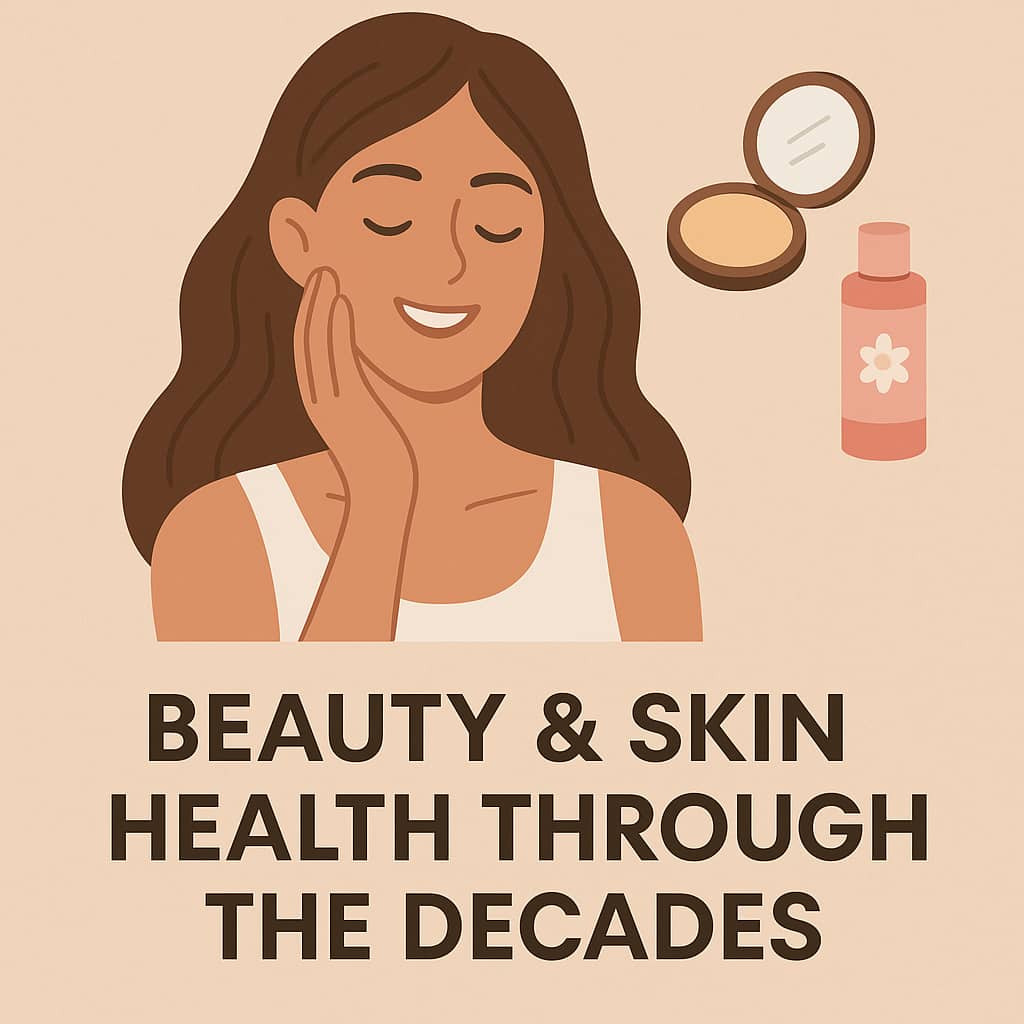

Beauty & Skin Health Through the Decades
Beauty isn’t about perfection it’s about radiance, confidence, and self-care that evolves with you. A woman’s skin is like a personal diary, reflecting every stage of life the late nights of youth, the hormonal shifts of motherhood, and the wisdom that comes with age. But with mindful habits and age-appropriate care, you can keep that natural glow alive through every decade.
In Your 20s: Build the Foundation
Your 20s are the perfect time to establish healthy skin habits that will serve you for life. Hormones are active, cell turnover is fast, and your skin naturally glows — but late nights, stress, and sun exposure can start leaving subtle marks.
Sunscreen is non-negotiable. UV rays are the biggest cause of premature aging — use SPF 30 or higher every day, even indoors.
Hydration is your best friend. Drink water, use light moisturizers, and eat water-rich foods like cucumbers and oranges.
Cleansing and exfoliation: Clean your face twice daily and exfoliate once or twice a week to remove buildup.
Nutrition matters: Eat foods rich in antioxidants (berries, spinach, green tea) to protect from free radical damage.
This is also the decade to prevent damage not fix it. Build consistency, and your skin will thank you for decades to come.
In Your 30s: Repair and Renew
By your 30s, life gets busier work, family, and responsibilities increase stress, while collagen production begins to slow. The skin may start showing early signs of fatigue or fine lines.
Add targeted care. Incorporate serums with vitamin C, hyaluronic acid, or peptides to boost radiance and hydration.
Manage stress levels. Stress can trigger breakouts and dullness — relaxation techniques and mindfulness make a visible difference.
Prioritize sleep. Skin regenerates while you rest; aim for 7–8 hours of uninterrupted sleep.
Eat omega-3–rich foods like salmon, flaxseeds, and walnuts to maintain elasticity.
Hormonal balance: Monitor changes like adult acne or dryness — these often link to stress or hormonal fluctuations.
At this stage, beauty equals balance — between self-care, nutrition, and rest.
In Your 40s: Protect and Rejuvenate
As estrogen levels decline during perimenopause or menopause, skin may become thinner, drier, and less firm. This is a crucial decade for nourishing and protecting from within.
Choose richer moisturizers that lock in hydration and support the skin barrier.
Exfoliate gently to enhance cell renewal and prevent dullness.
Boost collagen naturally through protein-rich foods and topical retinol or collagen-based creams (if your skin tolerates them).
Don’t skip sunscreen, as sun damage becomes more visible in this phase.
Prioritize relaxation and movement: Yoga and breathing exercises improve blood flow, bringing a youthful glow.
Remember glowing skin in your 40s comes not just from products, but from a peaceful mind and balanced lifestyle.
Beyond 50: Embrace Graceful Aging
Aging gracefully doesn’t mean resisting age it means nurturing your beauty with wisdom. Your skin now needs extra love, moisture, and protection.
Moisturize deeply with ceramide or shea butter–based creams.
Gentle cleansing keeps your skin calm and comfortable.
Add antioxidants and collagen supplements after consulting your doctor.
Massage your face regularly to improve circulation and relaxation.
Stay confident. Confidence is timeless — the most powerful beauty secret of all.
Natural radiance in your 50s and beyond is a reflection of how you’ve cared for your mind, body, and soul through the years.
Holistic Beauty Habits for Every Age
Eat colorful foods: Each color provides unique skin-loving nutrients.
Stay active: Exercise increases oxygen flow, giving your skin a healthy glow.
Sleep well: No cream can replace a good night’s rest.
Think positive: Your face reflects your inner energy happiness truly glows.
Beauty is not about youth it’s about vitality. When you feed your skin with nutrition, movement, hydration, and kindness, it responds with a glow that no product can replicate. Through every decade, your skin tells your story make it a story of care, confidence, and celebration.
Mind – Body Connection & Holistic Living
Your body listens to everything your mind says and your mind, in turn, reflects how well your body feels. This invisible bond between the two is called the mind – body connection, and it’s the cornerstone of holistic living. True wellness doesn’t come from diet or exercise alone; it comes from harmony when your thoughts, emotions, and physical energy move in the same rhythm.
Holistic living isn’t about strict routines or perfection; it’s about balance. It’s about tuning in to your body’s needs, nurturing your emotions, and finding peace in the present moment. When a woman lives in alignment with her inner self, she radiates calm, strength, and grace both inside and out.
The Science of Mind-Body Connection
The link between mind and body is more than just philosophy it’s backed by biology. Stress, anxiety, and negative thoughts trigger hormones like cortisol and adrenaline, which can lead to headaches, weight gain, fatigue, or even skin breakouts. Conversely, positive emotions and relaxation release endorphins and serotonin the body’s natural mood boosters.
This means your mental state literally shapes your physical health. A calm, happy mind signals your body to repair, heal, and function smoothly.
Mindfulness: The Art of Being Present
Mindfulness isn’t about sitting cross-legged for hours it’s simply the practice of being aware of what’s happening right now.
Start small: Take five slow, deep breaths whenever you feel tense.
Be intentional: Eat, walk, or even drink your tea mindfully — notice the taste, texture, and sound around you.
Unplug regularly: Put away screens and let your senses connect with the real world.
Try short meditation breaks: Even five minutes of silence can reset your mood and focus.
Mindfulness strengthens emotional control, improves sleep, and helps you react calmly during stressful situations a skill every woman deserves to master.
Yoga, Movement & Breath
Your body stores emotions stress tightens your shoulders, anxiety knots your stomach, and fatigue drains your posture. Movement helps release those trapped tensions.
Yoga unites breath, body, and mind improving flexibility, strength, and inner peace.
Dance or stretching helps you express emotions freely and joyfully.
Breathwork (Pranayama) improves oxygen flow, balances hormones, and reduces stress.
Just 15–20 minutes of gentle yoga or breathing each day can transform your energy levels and emotional stability.
Holistic Nutrition for Mental Balance
What you eat affects how you feel. Your gut is often called your “second brain” because it directly communicates with your mind through the gut brain axis.
Eat foods rich in omega-3s, magnesium, and probiotics they improve mood and mental clarity.
Stay hydrated dehydration can cause irritability and fatigue.
Choose real, colorful foods instead of processed snacks; they fuel focus and happiness.
Balanced eating is not only nourishment for the body it’s fuel for a peaceful mind.
Emotional Wellbeing: Releasing What You Carry
Holistic living invites you to acknowledge emotions, not suppress them. Bottled-up stress eventually shows up as physical discomfort.
Journal your thoughts to release mental clutter.
Talk about what bothers you vulnerability builds inner strength.
Practice forgiveness not for others, but to free yourself from emotional weight.
Peace begins when you stop fighting your own feelings.
Spiritual & Social Balance
Holistic health also embraces purpose, community, and gratitude.
Spend time with people who uplift you.
Engage in hobbies or causes that give life meaning.
Practice gratitude daily it shifts focus from what’s missing to what’s abundant.
Remember, spirituality doesn’t have to be religious; it’s about connection to yourself, to others, and to the universe around you.
The Holistic Woman’s Mantra
“I eat to nourish, move to energize, rest to restore, and think to empower.”
When your body is strong, your mind calm, and your heart light, life feels balanced not rushed. Holistic living is not a destination but a daily choice to slow down, breathe deeply, and honor the beautiful connection between your inner and outer worlds.
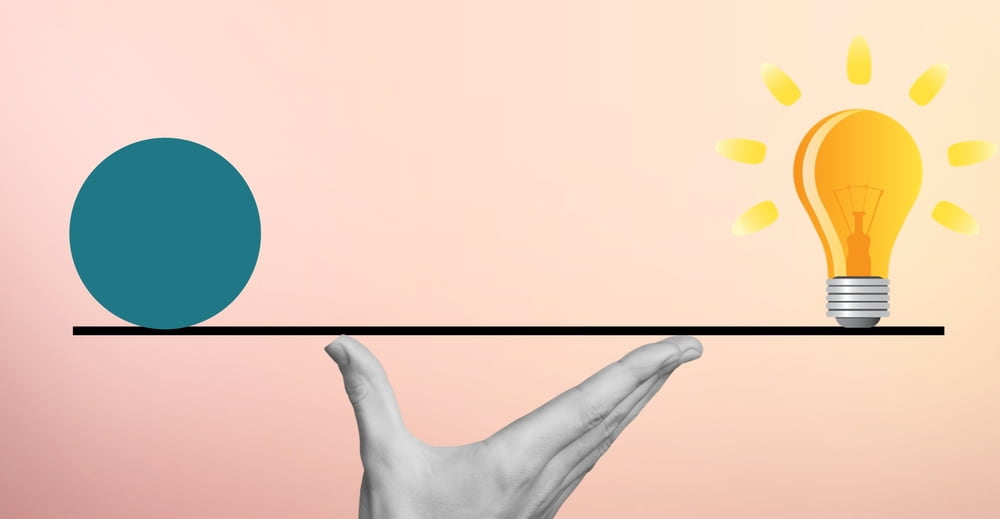

Common Myths vs. Facts About Women’s Health
When it comes to women’s health, misinformation spreads faster than truth. From old wives’ tales to social media “hacks,” many women unknowingly follow advice that does more harm than good. Let’s break the cycle and separate fact from fiction – because real wellness begins with real knowledge.
Myth 1: “Painful periods are normal – just tolerate them.”
Fact: While mild discomfort during menstruation is common, severe pain, fatigue, or irregular cycles are not normal. They could indicate underlying issues like PCOS, endometriosis, or thyroid imbalance. Persistent pain deserves medical attention it’s your body’s way of asking for care, not endurance.
Myth 2: “Calcium only matters after 40.”
Fact: Bone health starts building in your 20s and peaks around your early 30s. After that, bone density naturally declines which is why adequate calcium and vitamin D intake early on helps prevent osteoporosis later. Healthy bones are built long before menopause begins.
Myth 3: “Taking vitamins can replace a healthy diet.”
Fact: Supplements can support your nutrition but can’t replace it. Whole foods provide a complex mix of fiber, minerals, and antioxidants that pills can’t match. Think of supplements as a “sidekick,” not the hero real nutrition comes from a balanced plate, not a bottle.
Myth 4: “Heart disease mostly affects men.”
Fact: Heart disease is actually the leading cause of death in women worldwide. Women often experience subtle symptoms like fatigue, nausea, or jaw pain instead of chest pain. Regular checkups, exercise, and stress management are key to prevention regardless of gender.
Myth 5: “Expensive skincare equals better results.”
Fact: The best skincare routine is simple, consistent, and suited to your skin type. A gentle cleanser, a good moisturizer, and daily sunscreen are far more effective than costly, overhyped products. Healthy skin thrives on care not on price tags.
Myth 6: “Mental health problems mean weakness.”
Fact: Emotional challenges like stress, anxiety, or depression are human experiences, not flaws. Women often carry multiple responsibilities that strain mental health. Seeking therapy, rest, or self-care isn’t weakness it’s strength and self-awareness.
Myth 7: “You should lose weight to be healthy.”
Fact: Health isn’t defined by size. A woman can be slim yet unfit, or curvy yet strong and healthy. Focus on strength, stamina, energy, and mental peace, not just the number on the scale. Balanced nutrition and movement matter more than restrictive dieting.
Myth 8: “Menopause means life slows down.”
Fact: Menopause isn’t the end of vitality it’s a new phase of freedom. With balanced nutrition, regular exercise, and emotional support, women can stay active, strong, and radiant well into their 50s and beyond. It’s a transition, not a decline.
Myth 9: “If you feel fine, you don’t need checkups.”
Fact: Many conditions like high blood pressure, diabetes, or early cancer show no symptoms initially. Preventive checkups catch issues early and can save lives. Health is not just the absence of illness, but the presence of awareness.
Myth 10: “Holistic practices like yoga and meditation are only for spiritual people.”
Fact: Yoga, breathing, and mindfulness are scientifically proven to reduce stress hormones, improve focus, and support heart and immune health. You don’t need to be spiritual just open to balance and calm.
Takeaway
Knowledge is power but only when it’s rooted in truth.
By replacing myths with facts, women gain the clarity to make informed choices about their bodies, minds, and futures. Health is not about perfection; it’s about awareness, consistency, and kindness to yourself.
Every myth you unlearn brings you one step closer to real freedom the freedom to live strong, healthy, and confidently as the amazing woman you already are.
Embrace Your Next Chapter Complete Women’s Health Tips for Every Age
Women’s health is not a single chapter it’s a lifelong story. From the energetic 20s to the transformative 40s and beyond, your body constantly evolves, asking for care, attention, and balance. Each section of this guide from nutrition and exercise to mental wellness and hormonal health is a reminder that self-care is not indulgence, it’s responsibility.
You are not just taking care of your body; you are nurturing the vessel that carries your dreams, strength, and love for others. When you eat mindfully, move joyfully, rest peacefully, and think kindly you create a version of yourself that radiates wellness in every direction.
Here’s what to remember as you continue your wellness journey:
Listen to your body. It speaks through your energy, sleep, mood, and cravings respond with compassion.
Make prevention a priority. Routine checkups, balanced diet, and mindful habits are the true health insurance.
Protect your peace. Your mental calm is as vital as your physical fitness.
Consistency beats perfection. It’s not about doing everything at once; it’s about doing something every day.
Celebrate every phase of womanhood. Every decade brings its own beauty, strength, and wisdom honor them all.
At CoreWellFit, we believe health is not a destination but a way of living. Our mission is to help women around the world embrace holistic wellness balancing mind, body, and spirit through practical tips, positivity, and science-based guidance.
So, as you close this guide, take a moment to ask yourself:
“What’s one small thing I can do today to feel stronger, calmer, and more connected to myself?”
Start there a five-minute stretch, a glass of water, a deep breath, or a good night’s sleep. Because every little act of care is a promise to your future self.
You deserve health, happiness, and harmony every day, at every age.
Continue your journey with CoreWellFit’s inspiring resources on women’s wellness, nutrition, and mindful living. Visit CoreWellFit.com and take the first step toward the healthiest, happiest version of you.


